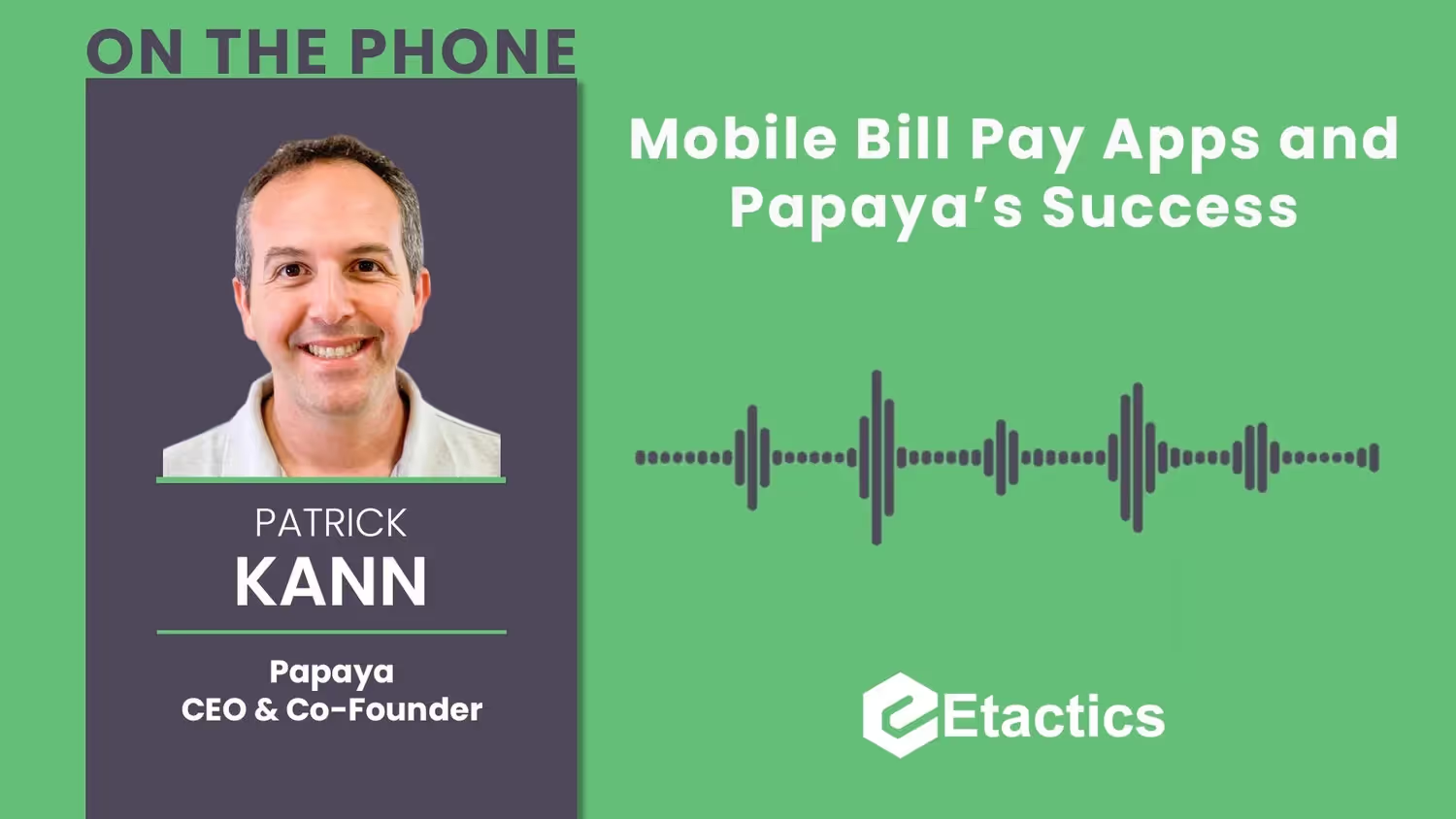We Spoke with Patrick Kann, CEO and Co-Found of Papaya, About Mobile Bill Pay Apps and Papaya's Success
We recently spoke to Patrick Kann about his company’s mobile bill pay app, Papaya, and its recent recognized success within the healthcare space.

Paying bills is a task that no one likes to do but it’s inevitable. What’s worse is that there are so many factors that could go wrong while working through the process manually and most of them fall outside of your control.
Imagine if paying a bill was as easy as swiping your credit card for a purchase.
We recently spoke to Patrick Kann about his company’s mobile bill pay app, Papaya, and its recent recognized success within the healthcare space.
Matt: Thanks for letting me sit down with you today Patrick. Before starting the interview I want to give our audience a quick introduction.
Patrick Kann is the CEO and Co-Founder of Papaya, a HIPAA and PCI compliant bill pay app that allows users to snap a picture of any bill they receive and pay it immediately.
Patrick originally hails from Brazil where he received his Bachelor’s of Science in Industrial Engineering. He then moved to the United States where he received his MBA at Stanford University.
After graduation, Patrick gathered professional experience as a Private Equity Executive, Director of Corporate Development, an innovator at a technology incubator, and as a board member for a video game discovery and HTML5 cross-promotion service.
By 2015 he co-founded Papaya with his colleague and current CTO, Jason Meltzer.
Since then, Papaya has received recognition from the Pay Awards, the Professional Association of Healthcare Office Management, and most recently by winning HFMA’s Virtual Pitch contest in June 2019.
Patrick, that’s quite an impressive resume.
As I mentioned in your introduction you have an extensive background with mobile apps.
Can you elaborate on your past experience in a technology incubator? How did those experiences help you get to where you are today?
Patrick: Thanks, that’s a good question. I joined Idealab, which is one of the most well -nown incubators in the US. My role mainly involved evaluating ideas, determining how to build a company around them, and allocating our resources to each.
In this position, I quickly learned the pitfalls of early-stage startups. Specifically, I learned a lot about what should be done to run a company and also about what could lead to disasters throughout their life.
One of the most important things that I learned in my years at Idealab was the importance of focus and speed. It’s very important to know exactly what you are focusing on because if it’s wrong it’ll potentially lead to unoptimized success. However, focusing on multiple wrong things at once is also a formula for disaster.
I was involved with maybe one-hundred different startups and I learned a lot about distribution, product development, fundraising, exiting strategies and sales startups.
Matt: Having the opportunity to learn where to appropriately focus your startup is a huge takeaway from your experience at Idealab. Startups need a clear objective to stick to in order to be successful.
While you were at the incubator it seems you took a particular interest in a video game cross-promotion service called GameMix.
What’s the story behind that? Could you explain your role?
Patrick: Absolutely. I was more interested in putting passionate people together into teams that perform really well together rather than the video game industry.
In the case of GameMix, the CEO of the company Ivar Chan saw an interesting opportunity in the video game exhibition space. He put together an incredible team that executed very fast and within 26 months from the inception of the company, after just two rounds of financing, the company was acquired by Kick.
It’s very humbling to me, especially with this particular example, to see how an idea can transform into a business; one where people are getting involved and are appropriately rewarded.
Within GameMix my goal was to pinpoint talent for the CEO, provide initial seed funding, and I was also a board member throughout those two years.
Matt: Only taking 26 months before being acquired is impressive. It’s always interesting to see what companies bring to the table in terms of new technology, especially in such a massive industry like video games.
Let’s move toward your current venture, Papaya. According to your LinkedIn, you left your position at GameMix 2 months before starting Papaya in December of 2015. That’s an incredibly fast transition.
Can you share with us the origin story behind Papaya? Did you ever know you’d be working within the bill pay space?
Patrick: That’s a very good question. So throughout my career, I always try to combine two aspects; one is building businesses that can grow, but more importantly, I’m very interested in impact-driven businesses.
In the United States, almost 77% of American families suffer from stress and anxiety when paying their bills. This makes paying bills by far their number one source of anxiety. It has a negative connotation and is a real problem for most American families.
I strive to make an impact by allowing families to have a more meaningful life. Today, only 2.4% of bills are paid via mobile device, which is clearly an anomaly compared to any other vertical in the American economy.
Combining the possibility of making a big impact on one of the major problems within society with a clear business opportunity is very exciting for me to work on and dedicate my life to.
Matt: Paying bills can sometimes be an arduous process between receiving the bill in the mail, writing a check, and sending it back. That’s not even mentioning the financial aspect of it all, so it makes sense why it causes so much stress.
It’s obvious that Papaya has filled a gap within the bill pay industry. Since it’s been available for download on the Apple App and Google Play stores, it’s captured thousands of installs and maintains a 4.8-star rating on both markets from almost 4,000 user reviews.
While developing the application, did you have any idea that the app would have such a positive response? Did you think Papaya would do particularly well within the patient payment space?
Patrick: We never knew preemptively that we were going to have such a good, positive response. But we followed clear principles throughout the app’s development.
There are three main principles that we kept in mind while building Papaya that led us to such positive responses.
Number one is offering the app for free. We believe that, from a user perspective, convenience fees would not be a sustainable business model. While in development, we made sure to create a solution that’s free.
The second driver is the fact that it’s virtual. It’s extremely fast and easy to pay any bill that you have right in front of you. All you need to do is take one picture. On average, it only takes our users 8 to 11 seconds to pay a bill.
The third driver that we use in all of our decisions is actually the most important. It’s the concept of being universal. So with the Papaya app, not only can you pay the bill that is right in front of you, but it can be any type; a church donation, parking tickets, utility bills, or medical bills.
We developed an advanced computer vision that understands any bill that you have in front of you. We also provide eighteen methods of payment automation so that any and every bill gets paid in a timely manner.
Matt: If there’s one thing you made clear in your answer there, it’s that when Papaya says any bill you guys mean that.
While we’re on the topic of accolades, I mentioned in your introduction that Papaya won HFMA’s Virtual Pitch Contest in June. Congratulations!
Can you explain how you got involved with that contest and share a little bit of information about Papaya’s pitch? Did you expect that the app would be so well-received and win?
Patrick: It was humbling to receive this accolade. We’ve received a few others throughout the life of the company and it’s always very humbling because there are a lot of companies competing with impact-driven approaches.
I think that both the judges and the audience related to the problem of bill payments and how much of a hassle and pain it is. There are big opportunities lying ahead of us.
Matt: Well congratulations on your success. All of the different awards you and your team have won is definitely something to be proud of.
At Etactics, we love talking about compliance. Papaya openly advertises that it’s both HIPAA and PCI compliant.
Since you guys are dealing with a lot of sensitive information from both healthcare and payment perspectives, how do you ensure that the data you’re dealing with is secure? What background processes happen after a user snaps a picture of their bill and pays with Papaya?
Patrick: I’m glad that you asked this question because we put a lot of our resources into HIPAA, PCI, and other security-related aspects.
We treat all of the data as if it were our own because I would personally want my own to be protected. When it comes to HIPAA, we ensure that all of our processes and technology appropriately follow HIPAA mandates. We also have appropriate insurances in place as well.
Similarly with PCI compliance, all credit card and payment data is handled in the appropriate SSL certificates. This information is also temporarily stored in the PCI Level 1 compliance servers.
Matt: The reason why I asked that question is that data and privacy are such hot topics right now. It’s refreshing to hear that you and your team take such precautions to protect your users.
There are what seems like thousands of different payment services out there. What’s different with Papaya is it’s considered a “bill pay” service in that the user makes payment directly to Papaya and then you make a payment on behalf of the user.
Some age groups are naturally more apprehensive about technology. Getting these users to download the app is one thing, having them trust the service is another.
If you could reach out to these users, how would you persuade them that Papaya is a better alternative than more traditional forms of payment?
Patrick: We’ve been very lucky, I think we hit many demographics.
We actually see adoption regardless of age. We have two peak age groups. One is the early thirties, a logical segmentation.
But most interestingly, we also see the mid-fifties. They are tech-savvy enough and our app is very simple to use, so we see a big group of users that fit within this age group.
Funny enough, our number one user is in his mid-eighties, he has the most number of bills and I’ve had a few conversations with him. The simplicity of our app makes paying bills as easy as it is to use a credit card, something every age already uses as a form of payment.
You brought up a very interesting aspect regarding trust. Trust is by far one of the most important aspects so we make sure to have UI/UX that helps create it. We also explain our accolades so that users understand what they mean. Finally, we ensure that we only partner with trustworthy companies, such as Etactics.
Matt: Wow, the fact that your number one user is what’s considered as “senior” from a demographic perspective is a testament to the user-friendly interface of Papaya.
According to a study by Merchant Savvy, mobile payments are expected to increase by almost 30% three years from now.
How does Papaya plan on catching that wave of growth? What are your future plans?
Patrick: In general, mobile payments are indeed expected to grow 30% three years from now.
But when it comes to mobile bill payments, the growth rate is much higher than that, so we are expected to see a much higher growth rate. As of today, the bill pay industry is growing approximately 20% per month.
In terms of our product’s roadmap, we have a mission of impacting American families in a positive way surrounding bill payments and the stresses surrounding them. We want to help in every aspect; planning, saving, and potentially paying later.
We have a lot of ideas on how to do that while being alongside our users helping them have more peaceful lives surrounding their finances.
Matt: That’s really what it’s all about, right? Impacting and helping American families pay their bills as easily as possible.
Patrick thank you again for taking the time out of your busy day for today’s interview.
Before logging off, is there anything else you’d like to mention about Papaya or something else you’d like to share?
Patrick: The way Papaya is growing today is by partnering with companies that send out bills and also with statement providers such as Etactics.
If anyone is interested in leveraging our technology, it’s easy to reach us. Reach out on our website (www.papayapay.com) and we’ll get back to you on the same day. The way we’ve developed our technology is free for users and also for our partners.
It’s been a real pleasure chatting with you, Matt. I wish you the best success.
Matt: Likewise, Patrick!
Emphasize your product's unique features or benefits to differentiate it from competitors
In nec dictum adipiscing pharetra enim etiam scelerisque dolor purus ipsum egestas cursus vulputate arcu egestas ut eu sed mollis consectetur mattis pharetra curabitur et maecenas in mattis fames consectetur ipsum quis risus mauris aliquam ornare nisl purus at ipsum nulla accumsan consectetur vestibulum suspendisse aliquam condimentum scelerisque lacinia pellentesque vestibulum condimentum turpis ligula pharetra dictum sapien facilisis sapien at sagittis et cursus congue.
- Pharetra curabitur et maecenas in mattis fames consectetur ipsum quis risus.
- Justo urna nisi auctor consequat consectetur dolor lectus blandit.
- Eget egestas volutpat lacinia vestibulum vitae mattis hendrerit.
- Ornare elit odio tellus orci bibendum dictum id sem congue enim amet diam.
Incorporate statistics or specific numbers to highlight the effectiveness or popularity of your offering
Convallis pellentesque ullamcorper sapien sed tristique fermentum proin amet quam tincidunt feugiat vitae neque quisque odio ut pellentesque ac mauris eget lectus. Pretium arcu turpis lacus sapien sit at eu sapien duis magna nunc nibh nam non ut nibh ultrices ultrices elementum egestas enim nisl sed cursus pellentesque sit dignissim enim euismod sit et convallis sed pelis viverra quam at nisl sit pharetra enim nisl nec vestibulum posuere in volutpat sed blandit neque risus.

Use time-sensitive language to encourage immediate action, such as "Limited Time Offer
Feugiat vitae neque quisque odio ut pellentesque ac mauris eget lectus. Pretium arcu turpis lacus sapien sit at eu sapien duis magna nunc nibh nam non ut nibh ultrices ultrices elementum egestas enim nisl sed cursus pellentesque sit dignissim enim euismod sit et convallis sed pelis viverra quam at nisl sit pharetra enim nisl nec vestibulum posuere in volutpat sed blandit neque risus.
- Pharetra curabitur et maecenas in mattis fames consectetur ipsum quis risus.
- Justo urna nisi auctor consequat consectetur dolor lectus blandit.
- Eget egestas volutpat lacinia vestibulum vitae mattis hendrerit.
- Ornare elit odio tellus orci bibendum dictum id sem congue enim amet diam.
Address customer pain points directly by showing how your product solves their problems
Feugiat vitae neque quisque odio ut pellentesque ac mauris eget lectus. Pretium arcu turpis lacus sapien sit at eu sapien duis magna nunc nibh nam non ut nibh ultrices ultrices elementum egestas enim nisl sed cursus pellentesque sit dignissim enim euismod sit et convallis sed pelis viverra quam at nisl sit pharetra enim nisl nec vestibulum posuere in volutpat sed blandit neque risus.
Vel etiam vel amet aenean eget in habitasse nunc duis tellus sem turpis risus aliquam ac volutpat tellus eu faucibus ullamcorper.
Tailor titles to your ideal customer segment using phrases like "Designed for Busy Professionals
Sed pretium id nibh id sit felis vitae volutpat volutpat adipiscing at sodales neque lectus mi phasellus commodo at elit suspendisse ornare faucibus lectus purus viverra in nec aliquet commodo et sed sed nisi tempor mi pellentesque arcu viverra pretium duis enim vulputate dignissim etiam ultrices vitae neque urna proin nibh diam turpis augue lacus.




